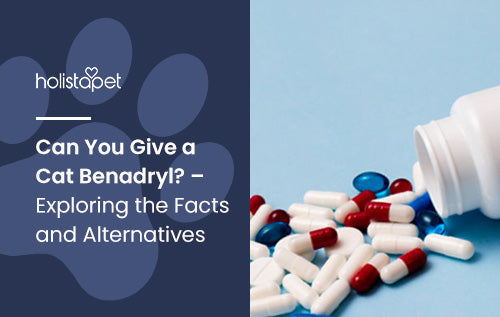Most people who suffer from acute allergic reactions from pet or food allergies solve it simply through a liquid Benadryl tablet. When your feline friend suffers similarly, many would think to treat allergies the same with Benadryl for cats. But can you even give a cat Benadryl? How much Benadryl is too much? Will it soothe their itchiness the way the medicine effectively got rid of your allergic symptoms?
Generally, Benadryl is considered safe in treating allergies and allergic symptoms in cats. This antihistamine has soothing effects. But just like in taking any medicine, you need to be sure about the causes of your cat’s problem. It's always best to consult your vet, especially if this is the first time you’re trying the medicine on them.
What Is Benadryl?
Benadryl is an antihistamine brand for a drug called diphenhydramine hydrochloride you can get over-the-counter. Antihistamines are intended to treat allergy symptoms in humans. They block the histamine, a chemical that your body creates, and the white blood cells distribute into your bloodstream when your immune system detects a potential allergen. The release causes allergic symptoms, which can be due to various triggers, including foods, mold, or pollen.
What Is It Used for?
Some cat owners give their pets Benadryl to relieve them of allergic reactions, including itchy skin. Some use it when their cats suffer from bug bites or untoward reactions to injections. Other pet owners utilize Benadryl as a quick fix to help their cats sleep soundly at night, calm them down during plane or car rides, or help them deal with nausea.
Related: Why does my cat attack me?
However, some findings prove that most cats have a different reaction to Benadryl tablets than humans. If the medication makes you sleepy, you may have thought giving Benadryl to your pet may get them to relax. Do not be surprised if they show the opposite reaction and become more energetic than usual, though not all cats would have this kind of reaction to the drug.

Their response varies, and you would only know how your pet would react to the drug after giving it to them. It is crucial to remember that there are situations when it is best to get your cat treated by a medical professional than to give them first-aid. They include getting bitten by a snake, insects you don’t recognize, or reptiles. These mishaps could be fatal if not properly treated quickly.
How Does Benadryl Work?
Benadryl’s primary function is to block the effects of histamine in humans and animals, including dogs and cats. The medication treats allergies and allergic responses, such as itching, sneezing, swelling, runny nose, and watery eyes. It can also help in relieving vomiting and motion sickness from environmental or food allergies. It’s included in the therapies intended for mast cell tumors, and it also works as a mild sedative.
Can You Give a Cat Benadryl?
Yes. It is safe to give your cat a small Benadryl dosage in moderation depending on the circumstances. However, it is best to consult your veterinarian to ensure that you are giving the proper dosage and that it is the right drug for the ailment or discomfort your pet is experiencing. While the drug is widely accepted to be safe by the veterinary community, Benadryl is not FDA approved for cats’ consumption.
They may suffer from an overdose if administered improperly, so it is your responsibility to follow proper dosage guidelines. It is also not advisable to give Benadryl to cats under other medications, those suffering from certain health conditions, and pregnant cats.
What Are the Side Effects of Giving a Cat Benadryl?
Benadryl is a short-acting drug, the effects of which stop within 24 hours. However, the effects may be longer in pets with kidney or liver problems. It can also cause potential side effects, especially in the case of an overdose. Here are some of the side effects your cat may experience from taking Benadryl. If you see them having any of these symptoms longer than usual, bring your pet to a vet to determine what’s causing the reaction:

- Gastrointestinal upset, including vomiting and diarrhea
- Urinary retention
- Dry mouth
- Sleepiness
- Lack of appetite
- Lethargy
- Hyperexcitability
Why Give a Cat Benadryl?
There are two main reasons you might resort to giving your cat a correct dosage of Benadryl for acute allergic symptoms and general allergic reactions.
- Acute allergic symptoms – hives or facial swelling caused by a vaccine, spider bite, or bee sting.
- General allergic reactions – diarrhea, vomiting, itchiness, sneezing; other effects of exposure to things they may be allergic to, such as plastic materials, rubber, cleaning products, dust, or pollen.
What to Consider Before Giving Your Cat Benadryl
Despite being generally safe for cats, you have to check the following procedures to ensure your pet’s safety when giving them Benadryl:
Avoid giving your cats Benadryl in gel capsules.
You can get Benadryl in a gel capsule, liquid form, and tablet. You may want to choose the last two when you need to give the drug to your cat. There are instances when gel capsules have a vehicle that can be irritating or even toxic to your pets. A sample of this vehicle is the solvent utilized as the active ingredient’s carrier.
Give your cat the right dosage.
Overdose can be life-threatening to cats. It can lead to breathing problems, seizures, or death. Since Benadryl is manufactured for animals weighing more than how much cats usually weigh, the drug in tablet form is usually cut. If you have small pets, you might find it easier to give the proper dosage when you provide them with the medication in liquid form.
Before administering Benadryl to your cat, make sure that the tablet does not contain ingredients that can be harmful to them, such as a decongestant or Tylenol. If you use the liquid form, request it from your vet or use the type intended for children. Generally, it is safe to give a milligram of the medicine for every pound of your cat’s weight every eight to twelve hours.
Go over the ingredients listed in the package of the medication.
There are Benadryl products with added benefits, meaning they contain more drugs. For cats, you can opt to buy the generic version or anything where the active ingredient is only diphenhydramine hydrochloride.
Monitor Your Cat’s Reactions After Taking The Drug.
Always check your cat’s reaction to the drug. There are cases when this drug given to cats to treat an allergic reaction may also cause an allergic reaction, or instances when your pet may get more energetic than relaxed. If the adverse reactions continue longer than usual, seek your vet for guidance.

Always Consult With Your Cat’s Veterinarian.
Even though Benadryl is an over-the-counter drug, getting clear veterinary advice goes a long way. A vet may check your cat’s health and monitor other medications they are taking and provide your cat with a proper dosage and check that you have the right kind of Benadryl suited for your cat.
Natural Alternatives For Your Cat
Many cat owners are searching for natural alternatives to make their pets calmer, especially when grooming and dealing with allergies and allergic symptoms. From herbal remedies to CBD, there is a plethora of available products that may benefit your cat. Here are some of the natural alternatives you can safely give to your cats:
Related Post: CBD Calming Chews for Cats
Chamomile
You can use chamomile as an antiseptic to kill bacteria and yeast. It contains apigenin that effectively blocks chemicals that may cause inflammation. You can also make a topical spray by brewing chamomile tea and allowing it to cool. If you find it hard to spray your pet with the liquid, you can dip your fingers in it and massage it on the affected body part. The effects of chamomile in cats have yet to undergo formal assessment.
Fish Oil
You can add fish oil to your cat’s food since it is loaded with fatty acid omega-3. Aside from reducing infections, omega-3 can soothe hot spots, reduce itching, and boost skin immunity. However, avoid cod liver oil since it has high vitamins A and D content, which is not suitable for your cat’s consumption.
Apple Cider Vinegar
You can use apple cider vinegar in washing your cat’s skin to get rid of the irritants since it has antibiotic and antibacterial properties. Do not use the vinegar undiluted since it can be too potent for your pet. To be safe, mix an equal amount of water and apple cider vinegar. Dip a paper towel into the solution and rub it gently on your cat’s skin. Avoid using the solution on your cat if their skin has a severe rash, puncture, or a cut.
Related: Why Does My Cat Cry When I Leave The Room?
Coconut Oil
This oil is antibacterial due to its lauric acid content. It also has good fats or medium-chain fatty acids that contain anti-inflammatory properties. It can soothe your cat’s dry or itchy skin and help heal damaged skin. The oil is non-toxic, so you can safely apply it topically. However, ensure that you don’t use too much at once. Your cat may suffer from a stomach upset if they lick too much coconut oil.
CBD Oil for Cats
CBD oil contains cannabidiol, a compound found within the hemp plant. Manufacturers extract CBD from hemp and mixes it with an all natural carrier mixture like hemp seed oil. Donning a subtle earthy flavor, add some drops from a convenient dropper into your favorite food or drink and enjoy.
CBD works by supporting your cat's endocannabinoid system, which is an essential regulatory system (present in all mammals) responsible for your cat’s overall wellbeing and balance. It regulates the body’s functions like appetite, discomfort, mood, swelling, and memory. That’s because receptors are found in all the body’s major systems.
Final Thoughts - Can You Give a Cat Benadryl
Benadryl is an over-the-counter drug that you can give to your cats to soothe allergic reactions or make them feel calmer. However, you must always check with your vet if the medicine is safe for your pet and the proper dosage, depending on your cat’s health and weight. A severe allergic reaction can be scary to deal with as a pet owner. While it may seem like a good idea, never supply your pet with medicine you're unsure about. And seek veterinary advice any chance you get to ensure your pet doesn't suffer more from a Benadryl overdose.



 CBD Oil for Cats - Fast Acting
CBD Oil for Cats - Fast Acting
 CBD Cat Treats - Easy Dose
CBD Cat Treats - Easy Dose
 CBD Calming Chews for Cats - Highly Rated
CBD Calming Chews for Cats - Highly Rated
 CBG Oil for Dogs and Cats - Loved by Thousands
CBG Oil for Dogs and Cats - Loved by Thousands




Leave a comment
All comments are moderated before being published.
This site is protected by hCaptcha and the hCaptcha Privacy Policy and Terms of Service apply.